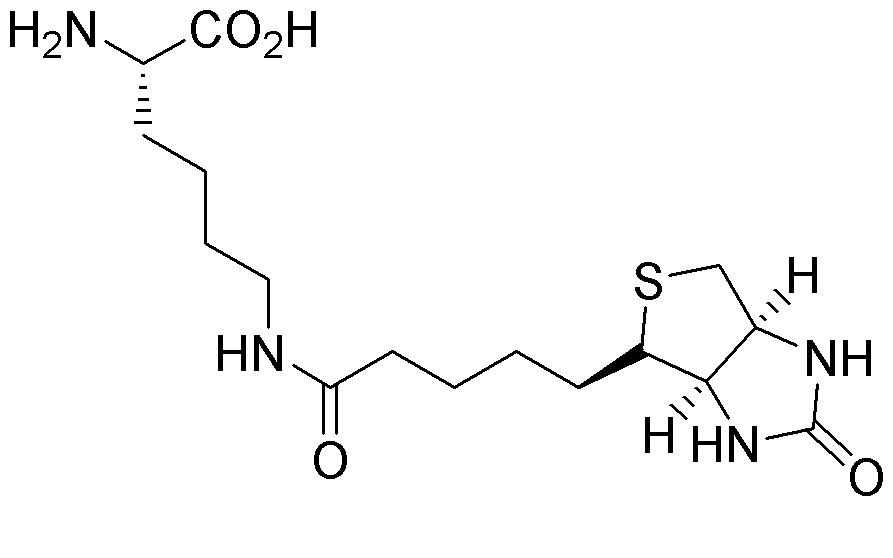Ne-Biotinyl-L-lysine is widely utilized in research focused on:
- Bioconjugation: This compound is commonly used in bioconjugation techniques, allowing researchers to attach biotin to proteins or peptides. This enhances the ability to purify and detect these biomolecules in various assays.
- Cell Biology: In cell culture studies, it serves as a valuable tool for studying cell surface proteins. By tagging proteins with biotin, scientists can easily isolate and analyze them, providing insights into cellular functions.
- Diagnostics: Ne-Biotinyl-L-lysine is utilized in the development of diagnostic assays, particularly in immunoassays. Its ability to bind to streptavidin allows for sensitive detection of biomarkers in clinical samples.
- Drug Delivery Systems: This compound can be incorporated into drug delivery systems to improve targeting and efficacy. By attaching drugs to biotinylated carriers, researchers can enhance the delivery of therapeutics to specific tissues.
- Protein Engineering: In protein engineering, it aids in the design of fusion proteins. By incorporating biotinylation sites, scientists can create proteins that are easier to purify and manipulate for various applications.
General Information
Properties
Safety and Regulations
Applications
Ne-Biotinyl-L-lysine is widely utilized in research focused on:
- Bioconjugation: This compound is commonly used in bioconjugation techniques, allowing researchers to attach biotin to proteins or peptides. This enhances the ability to purify and detect these biomolecules in various assays.
- Cell Biology: In cell culture studies, it serves as a valuable tool for studying cell surface proteins. By tagging proteins with biotin, scientists can easily isolate and analyze them, providing insights into cellular functions.
- Diagnostics: Ne-Biotinyl-L-lysine is utilized in the development of diagnostic assays, particularly in immunoassays. Its ability to bind to streptavidin allows for sensitive detection of biomarkers in clinical samples.
- Drug Delivery Systems: This compound can be incorporated into drug delivery systems to improve targeting and efficacy. By attaching drugs to biotinylated carriers, researchers can enhance the delivery of therapeutics to specific tissues.
- Protein Engineering: In protein engineering, it aids in the design of fusion proteins. By incorporating biotinylation sites, scientists can create proteins that are easier to purify and manipulate for various applications.
Documents
Safety Data Sheets (SDS)
The SDS provides comprehensive safety information on handling, storage, and disposal of the product.
Product Specification (PS)
The PS provides a comprehensive breakdown of the product’s properties, including chemical composition, physical state, purity, and storage requirements. It also details acceptable quality ranges and the product's intended applications.
Certificates of Analysis (COA)
Search for Certificates of Analysis (COA) by entering the products Lot Number. Lot and Batch Numbers can be found on a product’s label following the words ‘Lot’ or ‘Batch’.
*Catalog Number
*Lot Number
Certificates Of Origin (COO)
This COO confirms the country where the product was manufactured, and also details the materials and components used in it and whether it is derived from natural, synthetic, or other specific sources. This certificate may be required for customs, trade, and regulatory compliance.
*Catalog Number
*Lot Number
Safety Data Sheets (SDS)
The SDS provides comprehensive safety information on handling, storage, and disposal of the product.
DownloadProduct Specification (PS)
The PS provides a comprehensive breakdown of the product’s properties, including chemical composition, physical state, purity, and storage requirements. It also details acceptable quality ranges and the product's intended applications.
DownloadCertificates of Analysis (COA)
Search for Certificates of Analysis (COA) by entering the products Lot Number. Lot and Batch Numbers can be found on a product’s label following the words ‘Lot’ or ‘Batch’.
*Catalog Number
*Lot Number
Certificates Of Origin (COO)
This COO confirms the country where the product was manufactured, and also details the materials and components used in it and whether it is derived from natural, synthetic, or other specific sources. This certificate may be required for customs, trade, and regulatory compliance.


